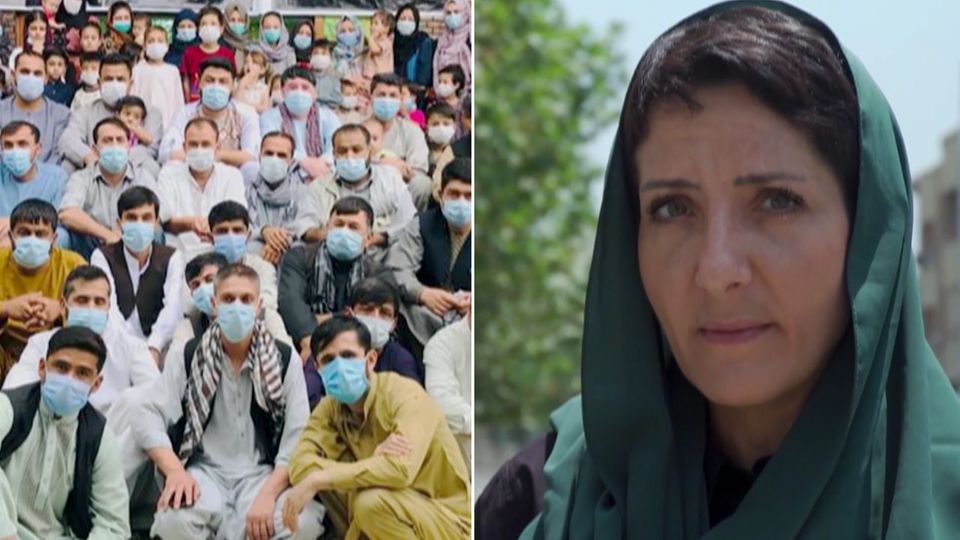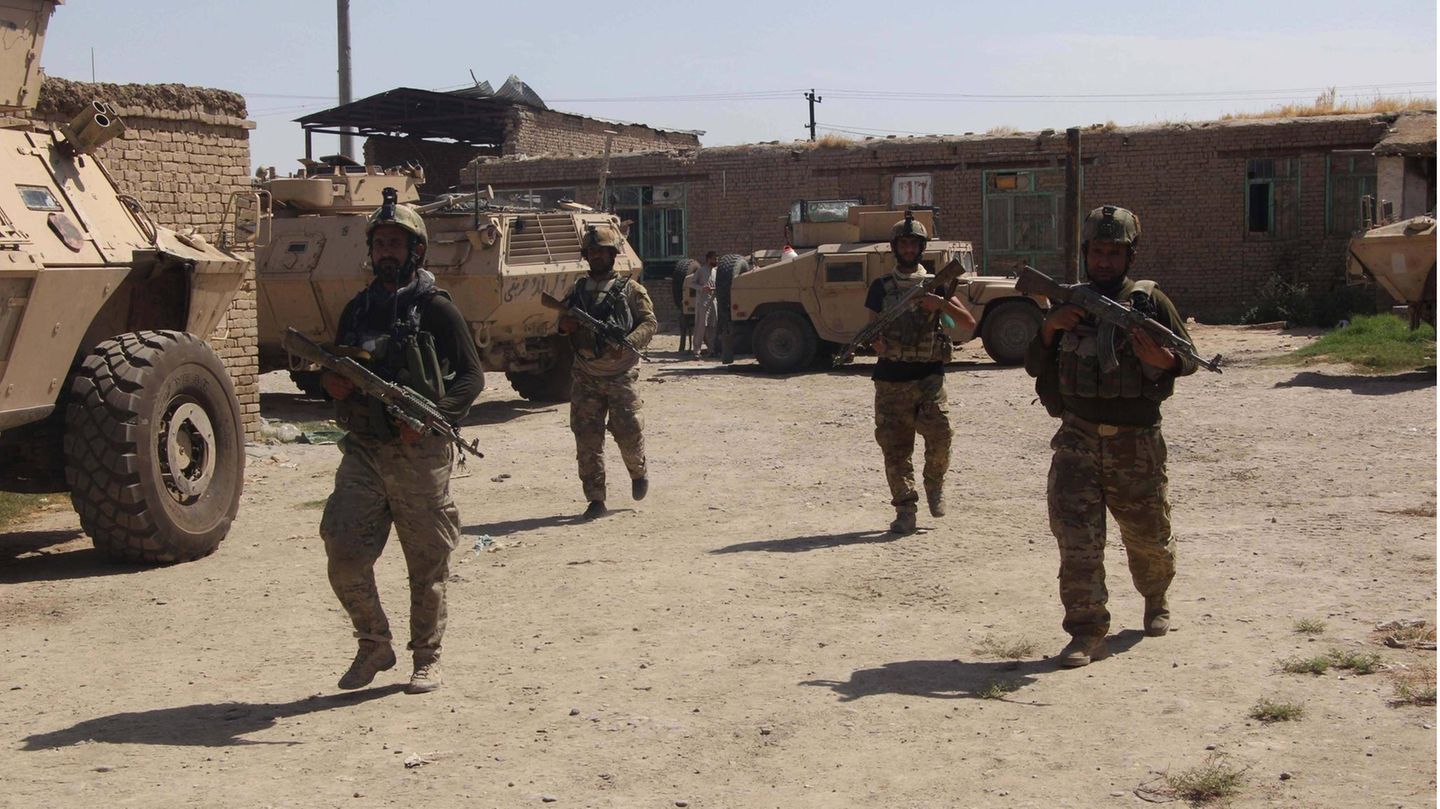The Bundeswehr was stationed in Kunduz in northern Afghanistan for almost two decades, helping to liberate the country from the Taliban. Dozens of German soldiers died. Now, after the withdrawal of the Bundeswehr, the provincial capital has fallen – back to the Taliban.
The militant Islamist Taliban have taken the provincial capital of Kunduz in the north of the country in Afghanistan. The city fell on Sunday after heavy fighting, three provincial councils and a resident confirmed to the DPA news agency. In Germany, Kunduz is best known because the Bundeswehr had a large field camp nearby for years. The Islamists had only recently been able to conquer the city of Sar-i Pul.
With this, the Taliban brought four provincial capitals under their control within three days. Since the start of the withdrawal of international troops from Afghanistan in early May, the Taliban have been running several offensives. First they were able to record massive territorial gains, especially in rural areas. They now control more than half of the approximately 400 districts in the country and also several border crossings. Most recently, the fighting has increasingly shifted to the capitals of the 34 provinces.
Government officials fled Kunduz
Kunduz has long been besieged by Taliban fighters. In the past two days, the Islamists have intensified their attacks, said the provincial councils. Apart from a military base around three kilometers from the city center and the airport, the Taliban now controlled the entire city. Government officials have fled there. The people in the city had neither water nor food. They hid in their homes.
According to the Defense Ministry, the Afghan troops started an offensive to recapture important facilities in Kunduz. “Some areas, including those with the buildings of the national radio and television, have been evacuated by the terrorist Taliban,” it said in a statement. The city is in “total chaos”, reported a resident of the AFP news agency.
Kunduz, with around 370,000 inhabitants, is also of great importance to the Bundeswehr, which withdrew from Afghanistan at the end of June after almost 20 years. Here German soldiers fought for hours with the Taliban. Nowhere in Afghanistan were more Germans killed than in Kunduz and the neighboring province of Baghlan. Last year around 100 German soldiers were stationed in “Camp Pamir”.
Kunduz came into focus in September 2009, when dozens of civilians were killed in a NATO air strike initiated by German Colonel Georg Klein. The background was the hijacking of two tank trucks by Taliban fighters near the German field camp. Klein feared that the tanker trucks could be used as rolling bombs against the camp.
Taliban is also on the rise in other regions of Afghanistan
At the request of the German armed forces, US fighter planes attacked the tanker trucks. However, there were numerous civilians in the vicinity. Exactly how many people were killed in the bombardment is still unclear. Officially, 91 dead and eleven injured are reported; independent counts assume 142 deaths.
In 2010, on Good Friday in Kunduz, fierce fighting broke out between the Bundeswehr and the Taliban, in which three German soldiers were killed. Three years later, the German field camp was handed over to the Afghan armed forces, and the roughly 900 Bundeswehr soldiers stationed there withdrew.
The situation in the city of Sar-i Pul with an estimated 180,000 inhabitants is similar to that in Kunduz. According to provincial councils, the Islamists have had the most important government buildings under their control since Sunday morning (local time). The security forces fought hard with them during the night. However, when the second police district fell, they left their posts and retired to a military base one kilometer from the city center. Government officials are now also in this military base. The Taliban fired mortar shells at them.
According to Provincial Councilor Massuma Schadab, there are several bodies in the streets. But nobody dares to rescue them. The province, in which oil deposits are extracted, borders, among other things, in the east on the provinces of Balkh with the capital Mazar-i-Sharif and in the north on the province of Jausdzhan. The government only holds the Balchab district in the province, the provincial councils said.
USA support with air strikes
On Friday, the small provincial capital Saranj in Nimrus on the Iranian border fell to the Taliban practically without a fight. One day later, the city of Schiberghan in Jausdschan in the north, seat of power of the controversial former warlord and ex-vice president Abdul Raschid Dostum, a leading anti-Taliban figure, followed.

According to the Afghan Ministry of Defense, the US, which has practically completed its withdrawal from Afghanistan, continues to fly air strikes in the country. A Taliban meeting in the city of Schiberghan had been attacked with B-52 bombers, a spokesman said. The US military mission in Afghanistan ends on August 31. According to American data, the withdrawal is more than 95 percent complete.
The Federal Foreign Office sees an increasing deterioration in the security situation in Afghanistan. After the Taliban took over Kunduz, a ministry spokesman said on Sunday at the DPA’s request that the situation was developing rapidly. The so-called asylum situation report had already been updated in the past if this was necessary. “An update of the asylum situation report is currently being prepared with a view to current developments.”
The asylum situation report serves as an aid in decision-making in asylum procedures and in the event of deportations. The federal government recently made it clear that it is currently out of the question of a general ban on deportation for people from Afghanistan.
The current asylum situation report by the Federal Foreign Office states that certain groups are at greater risk from the advance of the Taliban, but no general risk for returnees. However, it shows the status of last May – shortly before the start of the withdrawal of foreign troops.
David William is a talented author who has made a name for himself in the world of writing. He is a professional author who writes on a wide range of topics, from general interest to opinion news. David is currently working as a writer at 24 hours worlds where he brings his unique perspective and in-depth research to his articles, making them both informative and engaging.




